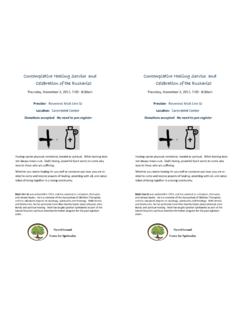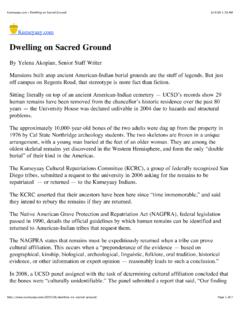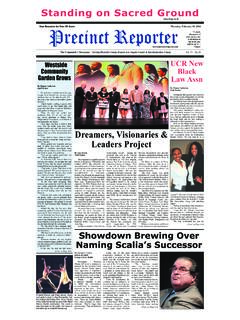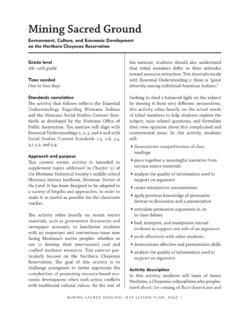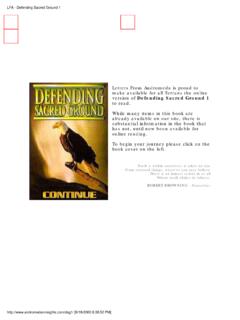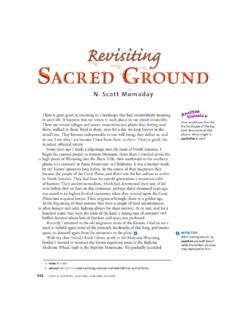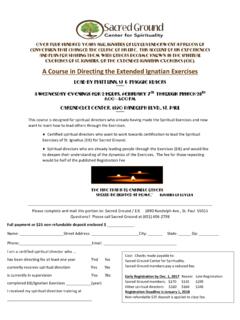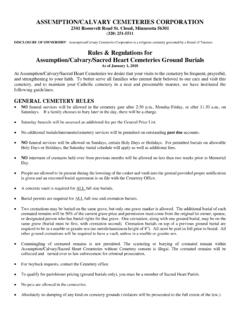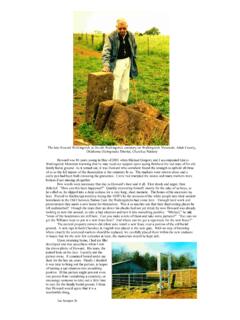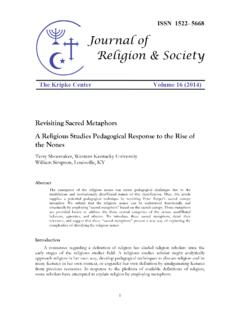Transcription of Masonic Etiquette - grandlodgefl.com
1 Masonic Etiquette THE LODGE SYSTEM OF Masonic EDUCATION Prepared by The Grand Lodge of Florida through the Masonic Education Committee in cooperation with the Committee on Work for use by the Particular Lodges and their members per Article IX, Section 2 (2) and Regulation (4) Revised 2010 Reprint 2010 GL208 The Lodge System of Masonic Education IMPORTANT This Booklet is complete within itself and may be used by anyone for information and enlightenment in Masonic Etiquette .
2 Questions on Masonic Etiquette should be referred to the proper Chairman, questions concerning ritual and ceremony should be referred to the Committee on Work, all others should be referred to the Masonic Education Committee. i Masonic Etiquette FOREWORD Freemasonry solicits no man to join it; it permits no man to make innovation in its body of principles and Landmarks; its Candidates come of their own free will and because they have heard good reports of its reputation and formed a favorable opinion of its work, and by all means throughout its entire system, and through all its bodies and Degrees whatever, by tradition, Landmarks, usage, custom, law, rule, Edict, Regulation, and Constitution, it is in every way secured that a Mason shall stand to it in an attitude of reverence and respect.
3 Of that reverence and respect, Etiquette is one of the forms. In principle, Masonic Etiquette belongs to the empire of good manners, that code by which gentlemen the world over govern their conduct; but this principle with us is found to apply in two directions: on the one hand it becomes a manifested respect for the Craft as a whole; on the other hand it is a form of courtesy to the individual. Long ago Lodges of Freemasons discovered the grave necessity of decorum; among the Old Charges to which every Candidate was required to acknowledge obedience, they gave the most prominent place to the sections under the general head of Behaviour. Among the oldest of our records, the Regius MS., written in 1390 , emphasizes the necessity for paying due respect to the Craft. In the Constitution of 1723, published by our Grand Lodge in its Book of Constitutions, it is specified, A Mason is obliged by his Tenure, to obey the moral law.
4 A Mason is a peaceable subject to the Civil Powers .. The Persons admitted members of a Lodge must be good and true men .. You are not to hold private Committees (in defiance of the Lodge), or separate conversation, without leave from the Master, nor to talk of anything impertinent or unseemly nor interrupt the Masters or Wardens, or any Brother speaking to the Master, nor behave yourself ludicrously or jestingly while the LODGE is engaged in what is serious or solemn; but to pay due respect to your Master, Wardens, Fellows and put them to worship that is, pay them the respect due them. The materials in this revised booklet are not to be taken as laws, regulations, or edicts adopted by Grand Lodge. If the reader of these introductory paragraphs shall have been led to exclaim, But what, after all, is this Etiquette ?
5 What does it cover? we refer him to the pages that follow, where Masonic Etiquette explains itself through the presentation of its practices for various occasions. The pages are arranged in Sections, the subjects of the Sections being arranged alphabetically like a dictionary, for convenience in rapid reference. ii TABLE OF CONTENTS Addressing the Chair ..1 Aged and Infirm ..1 Altar ..1 Ante-Room Etiquette ..1 Apron ..2 Bible Presentation ..2 Brother is a Chaplain ..3 Correspondence ( Masonic ) ..3 Discussion in District Deputy Grand Dress ..5 Election to Office ..6 Emblems and Flag ..6 Grand Grand Lodge ..9 Grand Lodge Officers ..9 Grand Marshal ..9 Grand Master s Jewels ..10 Marshal ..10 Master s Office ..11 Order in Lodge Room ..11 Past Grand Prayer ..11 Preparation Room ..12 Presents to Candidates.
6 12 Publicity ..13 Punctuality ..13 Speakers ..14 Titles ..15 Visiting Masters ..16 Visiting Teams ..16 Visitors ..16 iii 1 ADDRESSING THE CHAIR The rules of order in Freemasonry do not permit side discussion s, during a Communication, among members. The member who has anything to say to the Lodge, whether it be to enter discussion or to make or second a motion, must rise to his feet, wait to be recognized by and then address the Worshipful Master. AGED AND INFIRM Members of a Lodge who, because of age or infirmity, find it either difficult or impossible to attend at the assemblies of their Brethren stand in need of special consideration at the hand of their Lodge; and because of their condition, no others are so peculiarly appreciative of the kindness or courtesies that may be shown them.
7 A Lodge will maintain its contacts with them unbroken; will see that they are visited; will send them messages on special occasions, and perhaps encourage its members to remember them now and again with appropriate gifts or other reminders. Some Lodges follow the admirable custom of setting aside once each year a Patriarch s Night in honor of its aged members; others make it a practice at certain intervals to send a vehicle for such as are physically able to attend Lodge, but have not the means. ALTAR Our customs and traditions prohibit any Brother from passing between the Altar and the Worshipful Master while a Lodge is open. From ancient times the precinct between the Altar and the East has been deemed sacred ground , not to be trodden under foot; there should be no obstruction between the East and the Three Great Lights; and since the Great Lights and the Charter of the Lodge are the particular responsibility of the Worshipful Master, no Brother should ever obscure his view of them.
8 The fact that during the exemplification of the Work Candidates are sometimes placed there, does not mitigate against the interpretation, but rather supports it; for if the ground between the Altar and East is otherwise held sacred , the fact will make all the more impressive those initiation ceremonies which require that a Candidate be placed there. The ballot box should never rest upon the Bible but by its side or on a little stand at the Altar. The Altar must not be covered or decorated by the national or any other flag. Any embroidery, sign, or any other indications of any individual or any organization other than the Lodge itself or Grand Lodge is strictly forbidden. ANTE-ROOM Etiquette (TYLER TO ENFORCE) As soon as a Brother enters a Masonic Hall to attend a Communication; he comes under the sway of Masonic Etiquette .
9 If he is late he should not indulge in loud talking that may be heard in the Lodge and his demeanor toward other Brethren he may meet there should be courteous and respectful C there, no more than elsewhere, does Masonry give any man license to take personal liberties with another! This is especially true if any Candidates are present waiting their call to the Preparation Room; to give them the impression that vulgar conduct, levity, practical joking or other forms of disrespect are countenanced by the Craft is a misrepresentation of the Lodge and peculiarly a discourtesy to the Worshipful Master, who stands to all Candidates, among his many other functions, as a host in the name of his Lodge. The Tyler has it especially in charge to see that the Ante-Room, his own particular quarters, observes the same decorum as all other precincts of the Temple; and while the principal purpose of his sword is to be a symbol of his duty to keep out Cowan s and 2 eavesdroppers, it is scarcely a lesser meaning of it that he hold authority to maintain order at the doors, and to see that the portals are not profaned by disrespect.
10 Moreover, the Tyler, if he rightly understands his own art, will see that the Ante-Room is kept clean and in order, the aprons neatly piled, books, newspapers and litter not left scattered about, a fitting place, in short, through which to make entrance into a Masonic Lodge. No person is to be admitted into a Masonic Lodge unless by permission of the Worshipful Master. When a would-be visitor appears, it is the duty of the Tyler to notify the Worshipful Master of the presence of the visitor. The Worshipful Master may appoint a Committee to examine the visitor and report to the Master concerning the visitor s qualifications. If his documents are in order and if he has convinced the examining Committee that he is a Mason, then in all probability the Worshipful Master will grant him permission to enter. If a Brother is late, he does not enter the Lodge until permission is obtained from the Master through the Tyler and the Junior Deacon for him to do so; before entering he should see that his Apron and other regalia are already properly in place.
